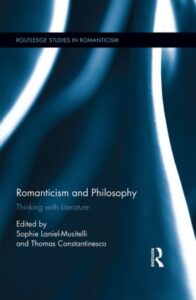
Romanticism and Philosophy
Thinking with Literature
Publication | Table des matières | Critiques
Résumé
This volume brings together a wide range of scholars to offer new perspectives on the relationship between Romanticism and philosophy. The entanglement of Romantic literature with philosophy is increasingly recognized, just as Romanticism is increasingly viewed as European and Transatlantic, yet few studies combine these coordinates and consider the philosophical significance of distinctly literary questions in British and American Romantic writings.
The essays in this book are concerned with literary writing as a form of thinking, investigating the many ways in which Romantic literature across the Atlantic engages with European thought, from 18th– and 19th-century philosophy to contemporary theory. The contributors read Romantic texts both as critical responses to the major debates that have shaped the history of philosophy, and as thought experiments in their own right.
This volume thus examines anew the poetic philosophy of Wordsworth, Coleridge, Blake, Shelley, and Clare, also extending beyond poetry to consider other literary genres as philosophically significant, such as Jane Austen’s novels, De Quincey’s autofiction, Edgar Allan Poe’s tales, or Emerson’s essays. Grounded in complementary theoretical backgrounds and reading practices, the various contributions draw on an impressive array of writers and thinkers and challenge our understanding not only of Romanticism, but also of what we have come to think of as “literature” and “philosophy.”
Table des matières
Introduction: Thinking with Literature Sophie Laniel-Musitelli and Thomas Constantinesco
Part I: Romantic Confrontations
1. Absolut Jena: A Second Look at Lacoue-Labarthe’s and Nancy’s Representation of the Literary Theory of Frühromantik Christoph Bode
2. History and Poetry: Fundamental Aspects and Affects of the Relations between Literature and Philosophy in English Romanticism Eric Dayre
3. “Ghostly Language”: Spectral Presences and Subjectivity in Wordsworth’s Salisbury Plain Poems Mark Sandy
4. Thinking without Being and Acts of Poetry in Shelley Arkady Plotnitsky
Part II: The Poetics of Thought
5. Prolegomenon to the Remnants: Shelley’s “Triumph of Life” Simon Jarvis
6. Wordsworth’s Thinking Places Pascale Guibert
7. Philosophy, Politics, Sensation: The Case of John Clare Yves Abrioux
Part III: Romantic Selves
8. Philosophies of Identity and Impersonation from Locke to Charles Mathews Angela Esterhammer
9. The Happiness of Romantic Philosophy Joel Faflak 10. Subjectivity and Despair in Blake and Kierkegaard Laura Quinney
11. Thomas De Quincey and Søren Kierkegaard: The Elective Affinities between Romantic Philosophical Autobiography and Autobiographical Philosophy Françoise Dupeyron-Lafay
Part IV: Transatlantic Romanticism
12. The Tension between Immanence and Dualism in Coleridge and Emerson Danielle Follett
13. Emerson’s Philosophy of Creativity Susan L. Dunston
14. The Perversity of Skepticism: Qualia and Criteria in Emerson and Poe Paul Grimstad Coda: Cavell and Wordsworth: Illuminating Romanticism Edward T. Duffy
Critiques
- “This important volume from an authoritative international team of authors sheds significant new light on the comparative development of post-war Conservatism in the western world.”
– Stuart Ball, Professor Emeritus, University of Leicester, UK - “The rich essays collected in this illuminating volume show that the rise of right-wing politics in the United Kingdom, the United States, and France since the 1970s was a remarkably transnational phenomenon. As they attacked social democracy and cultural pluralism, right-wing movements borrowed ideas, visions, vocabularies, and tactics from each other, adapting them to their own national idioms and using advances in one country to win advances elsewhere. Anyone interested in confronting the problems that have proliferated in the wake the right’s reconfiguration of politics – surging inequality, belligerent ethno-nationalism, worker disempowerment and insecurity, and lost faith in the capacity for democratic self-government – has much to learn about the origins of these problems from this important book.”
– Joseph A. McCartin, Georgetown University, USA, author of Collision Course
